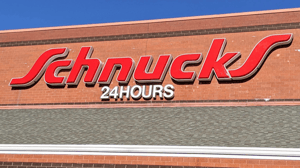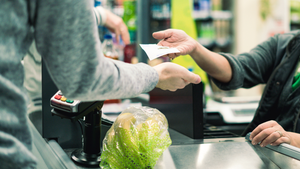Kroger tops 100,000 hirings since COVID-19 emergency declared
CEO Rodney McMullen: ‘In the coming months, we know our associates’ needs will continue to evolve’
May 14, 2020

The Kroger Co. said it has hired more than 100,000 workers over the past eight weeks, the period since President Trump declared coronavirus a national emergency.
Kroger said Thursday the new employees — including displaced workers from hard-hit business sectors such as restaurants, hotels and food service distributors — have expanded its overall work force to more than 560,000 associates. The Cincinnati-based grocer noted that, during the COVID-19 outbreak, the extra hands have enabled the company to maintain safe access to fresh, affordable food and other staple items for customers of its 2,757 supermarkets in 35 states and the District of Columbia.

“In the coming months, we know that our associates’ needs will continue to evolve and change, and our commitment is that we will continue to listen, be responsive and make decisions that advance the needs of our associates, customers, communities and business,” said Kroger CEO Rodney McMullen.
“Throughout the pandemic, Kroger’s top priority has been to provide and maintain a safe environment for our associates and customers with open stores, comprehensive e-commerce solutions and an efficiently operating supply chain,” Chairman and CEO Rodney McMullen said in a statement. “Since March, we have invested to reward our associates and safeguard our associates, customers and communities.”
Since March, Kroger has invested $700 million in bonus pay for associates and protections for workers, customers and communities. The retailer said these investments were included in a business guidance update on April 1, when the company reported a 30% jump in identical-store sales for March as consumers stockpiled groceries to shelter at home.
“In the coming months, we know that our associates’ needs will continue to evolve and change, and our commitment is that we will continue to listen, be responsive and make decisions that advance the needs of our associates, customers, communities and business,” McMullen added.

Since March, Kroger has invested $700 million in bonus pay for associates and protections for workers, customers and communities.
In the near term, those decisions will include whether to further extend bonus pay. On March 31, Kroger announced a “hero bonus” of $2 an hour for all frontline grocery, supply chain, manufacturing, pharmacy and call center associates for time worked from March 29 to April 18. That was later extended to May 2 and then to May 17. The company also paid out a one-time bonus of $300 to full-time associates and $150 to part-time associates on April 3.
The United Food and Commercial Workers (UFCW) union has continued to press Kroger to extend the $2-an-hour hero pay beyond May 17. Last week, seven UFCW locals in five Western states, representing more than 55,000 Kroger employees, said COVID-19 remains a threat to frontline grocery workers, and the danger could escalate as lockdown restrictions across the country ease and more consumers head to stores.
Los Angeles-based UFCW Local 770 reported about 200 COVID-19 cases among its membership overall through May 8. UFCW Local 7, based in Denver, said 49 members have tested positive for COVID-19 as of May 14, up from 39 a week ago, and one member — a courtesy clerk at a King Soopers supermarket in Brush, Colo. — has died from the virus.
“Hundreds of thousands of Kroger’s workers across the country, who risk their lives every day, are being told by the company that their hard work and sacrifice is not valued. This month Kroger has had record sales,” said Kim Cordova, president of UFCW 7, which represents over 14,000 Kroger workers in Colorado and Wyoming.
“Kroger needs to provide their own people with increased safety measures and to continue ‘hero pay,’” Cordova said. “As communities begin to reopen and stores have become more crowded, our members are being put at an even higher risk.”
UFCW 770 and 7 yesterday cited a May 12 Securities and Exchange Commission filing by Kroger that reported large increases in 2019 compensation for some company executives, including McMullen.
“It’s hard to hear about such huge increases for corporate executives when many of us are struggling just to make rent. The pandemic has exposed how low paid grocery and retail workers are despite the essential work we do,” Rachel Fournier, a cashier at a Ralphs supermarket in Los Angeles, said in a statement. “We are going to work every day in a pandemic risking our lives, and they want to cut our pay,” Fournier added.
According to UFCW 770 President John Grant, “We are fighting not to return to the status quo for working people and instead to ensure the people, across the whole food chain, who put food on our tables can put food on theirs.”
Kroger, which has joined with UFCW to get grocery store workers classified as first responders during the pandemic, reported that it has been investing in associate wages over the past three years.
With the launch of the “Restock Kroger” strategic plan in 2017, the company said it would invest $500 million in associate wages between 2018 and 2020, which has raised the average rate to over $15 per hour. Last November, Kroger said it expects to spend about $800 million over that time period on associate wages, excluding coronavirus-related associate investments.
“We provide our associates with health care and retirement benefits that many of our competitors do not offer their employees. This was true prior to the pandemic and remains true today,” said Tim Massa, senior vice president and chief people officer at Kroger. “Kroger also provides retirement benefits in the form of pension investments for many of our frontline associates, which fewer than 9% of U.S. companies provide. With health care and retirement benefits factored in, Kroger's average hourly rate grows from $15 to well over $20.”

“During these uncertain times, we’re humbled to be able to provide new career opportunities to workers in the industries most affected by this pandemic,” said Tim Massa, senior vice president and chief people officer at Kroger.
Even with the addition of 100,000-plus workers, Kroger said open jobs remain nationwide in the company’s stores, online business, manufacturing plants and distribution centers. In early March, the retailer expedited hiring by shortening the time between application and employment, onboarding hires in an average of 72 hours. A new focus on tasks versus role-based development, too, enabled new hires to acclimate to their role and expectations more quickly, the retailer said.
“During these uncertain times, we’re humbled to be able to provide new career opportunities to workers in the industries most affected by this pandemic,” said Massa. “Through our expedited hiring and onboarding process and cross-sector partnerships, we’ve welcomed more than 100,000 new associates to the Kroger family of companies in roles across our retail stores, e-commerce business, manufacturing facilities and distribution centers.”
Kroger added that, to date, the company’s investment in its Feed Your Future education assistance program has exceeded $8 million. Launched in 2018, Feed Your Future offers full- and part-time associates up to $3,500 annually ($21,000 over the course of employment) toward continuing education and development opportunities. Thus far, more than 5,000 associates have participated, with 87% being hourly store workers. T
Other support for employees during the COVID-19 crisis, Kroger said, includes testing to associates based on symptoms and medical need; emergency leave and paid time off for workers affected by the virus or experiencing symptoms; health care coverage, retirement benefits and mental health resources; and $5 million through the Helping Hands fund to aid associates experiencing financial hardships due to the virus, including childcare costs.
Kroger’s COVID-19 safety measures include supplying all associates with face masks; urging customers to wear masks in when in stores; limiting the number of shoppers in stores; deploying plexiglass shields at checkout and physical distancing floor decals in throughout stores; expanding contactless payment options; and pointing customers to online services, such as a new no-contact option for online grocery delivery, low-contact pickup service and ship-to-home service.
For our most up-to-date coverage, visit the coronavirus homepage.
About the Author
You May Also Like






